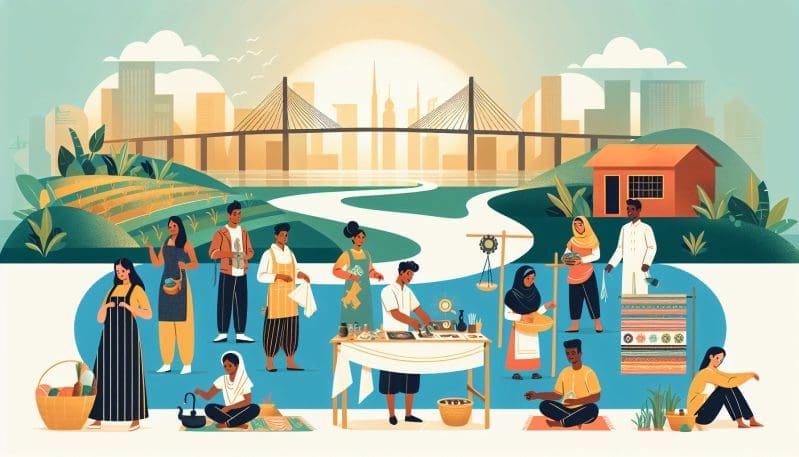Bridging the Skills Gap in Informal Economies: Pathways to Inclusive Learning and Development
- Home
- Bridging the Skills Gap in Informal Economies: Pathways to Inclusive Learning and Development

- Editors Desk
- February 8, 2024
- 0 Comments
In a rapidly evolving global economy, the informal workforce remains an often overlooked yet crucial component of labor markets around the world. From street vendors to self-employed artisans, the livelihoods of many individuals depend on informal employment opportunities. For No Worker Left Behind, understanding and addressing the needs of these workers is pivotal to fostering a more equitable and productive society.
Understanding the Unique Learning Needs
When we speak of the informal economy, we refer to a diverse landscape comprising workers who are not recognized, protected, or regulated by formal legislation. These workers often face barriers to traditional education and training programs, such as inflexible schedules, lack of recognition for their skills, and limited access to resources. This lack of formal education and training can perpetuate a cycle of poverty and limit economic mobility.
In rural areas, for instance, access to quality education may be scarce, leading to a workforce that relies heavily on traditional skills passed down through generations rather than formal qualifications. In urban settings, where the pace of technological advancement and market demand rapidly shifts, informal workers may find their skills and knowledge becoming outdated, leaving them vulnerable to market fluctuations.
Assessing Current Learning Platforms
Although there are numerous initiatives aimed at developing skills and providing education to the informal sector, the effectiveness and reach of these platforms can vary greatly. It is crucial to assess the extent to which these programs consider the unique circumstances of informal workers, such as variable income, lack of job security, and unregulated work environments.
Mobile learning platforms and flexible online courses have shown promise in reaching informal learners, but there remains a digital divide that can hinder access for the most marginalized workers. Programs must be designed with a deep understanding of the target community’s specific challenges and technological capabilities.
The Role of Technology
Technology has the potential to democratize learning and provide scalable solutions for informal economy workers. Digital literacy and the ability to navigate evolving tech landscapes are becoming as fundamental as traditional literacy. Tailoring technological tools to create inclusive and interactive learning experiences can empower workers to take control of their development pathways.
Mobile apps, for example, can offer bite-sized learning modules that fit into the irregular schedules of informal workers. These platforms need to be intuitive and user-friendly to accommodate varying levels of education and digital expertise.
Public-Private Partnerships
Collaborations across sectors have the potential to bring about transformative change in the way learning and development are approached for informal workers. Governments, NGOs, educational institutions, and private businesses can work together to design policies and programs that prioritize lifelong learning and skill development.
Such partnerships can facilitate funding, research, and sharing of best practices, all of which are essential components for developing successful learning programs. By leveraging each sector’s strengths, partnerships can create robust networks of support for informal workers seeking to improve their skills and economic prospects.
Measuring Impact
To ensure that these initiatives lead to substantive improvements in the lives of informal workers, we must establish clear metrics to measure impact. Monitoring progress and outcomes will help identify successful strategies and areas that require additional attention or rethinking.
Metrics might include increased income levels, improved job stability, heightened job satisfaction, and enhanced social mobility. To capture the full extent of any program’s impact, these measurements should be considered alongside qualitative assessments of worker empowerment and community benefits.
Case Studies
There is no shortage of innovative programs making a difference in the informal economy. For instance, initiatives like Kenya’s M-Pesa have revolutionized banking and financial education in regions where traditional banking infrastructure is sparse. Elsewhere, online platforms such as Khan Academy provide free access to quality education, benefiting learners with limited means.
Call to Action
We must extend a call to action to all stakeholders in the global workforce ecosystem. Let’s commit to creating pathways that recognize the significance of every worker and provide them with the tools and opportunities for continuous learning and development. It is essential that leaders, policymakers, educators, and businesses come together to invest in the future of the informal economy, ensuring that no worker is left behind.
Together, we can build a more inclusive world where every individual has the agency to learn, grow, and contribute to their fullest potential.

Leave A Comment